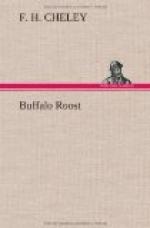The cabin was a little log affair, well-banked around the base with dirt and moss to keep out the cold. To all appearances the only two openings in it were the front door and a double window. One of the window panes was covered over with the end of an old egg crate, and another, which was not so badly shattered, was repaired by a burlap sack, wadded into the opening. A big pine stood just outside the door and cast its shade over the roofless veranda. At one side of the house stood an ancient, moss-covered, hollow pine log, into which a pipe ran from the spring, a few paces back in the gulch. This was the old stage watering-trough, made by Dad himself when the big cabin was built. Directly up the road a hundred paces stood the old stone chimney, a famous landmark of the region.
Mr. Allen went to the watering-trough and, filling his cup, called out:
“Here, you fellows, do you want a drink of the greatest ale in the world? It’s the purest of Mother Nature’s brews.”
The old pine door squeaked on its rusty hinges as it slowly opened.
“Well, sir, I’ll be dummed. Howdy, young ‘uns! Whar d’ ye hail frum? Huntin’ bar, er jist a roundin’ up a bunch o’ jay-birds? Haw, haw, haw! Yer ‘bout the fightin’est bunch o’ young dandies I’ve seen sence the war.”
Daddy Wright stood in the doorway, taking in every detail of the group. He was a little, shriveled-up man, with small, watery eyes set well back under shaggy white eyebrows. His head was protected by a very disreputable and time-worn black hat that looked as if it might have been in active service for at least a half a century. His clothes were shabby and dirty, and his feet were bare. It was one of the peculiarities of the old man that he rarely ever wore shoes, except in the coldest of winter; then he preferred his old, home-made moccasins. His straggly, gray whiskers were badly stained with tobacco from his constant companion—an old, corncob pipe. He was short and stout, and had of late years become very feeble, being just able to hobble about a little each day with the aid of a cane.
“Yew fellers with all yer fixin’s remind me a heap o’ some o’ the gangs o’ green city fellers I used to see when I was freightin’ on the old Spanish Trail—all guns an’ blankets an’ fixin’s, but not much real explorin’ blood in ye. Hain’t that ’bout so? Say, Hallen, jist explain to me what yer ca’clatin’ to do with these yere young roosters. Explorin’, huh—jist as I thought. Kick me fer a stick o’ dynamite if ye hain’t the beatenest bunch o’ explorers I’ve seed in many a moon. Lookin’ fer gold mines? Suthin’ bigger, I s’pose? I’d give half my grub stakes if Tad could see ye. Explorin’, eh? Yew remind me o’ the time me an’ Old Ben went explorin’ on Beaver Creek. We had ’nough truck ‘long t’ start a gold camp, an’ we walked an’ explored an’ explored. We must o’ walked fer well nigh onto three weeks, an’ all we ever seed in all that time was a pole-cat—an’ we wished we hadn’t o’ seed him, fer Ben had t’ bury every livin’ last stitch o’ his duds an’ walk home in his bare hide. Haw, haw! I wisht Tad ’ud come ‘long now an’ take a squint at yew fellers—he’d bust a bein’ tickled!”




